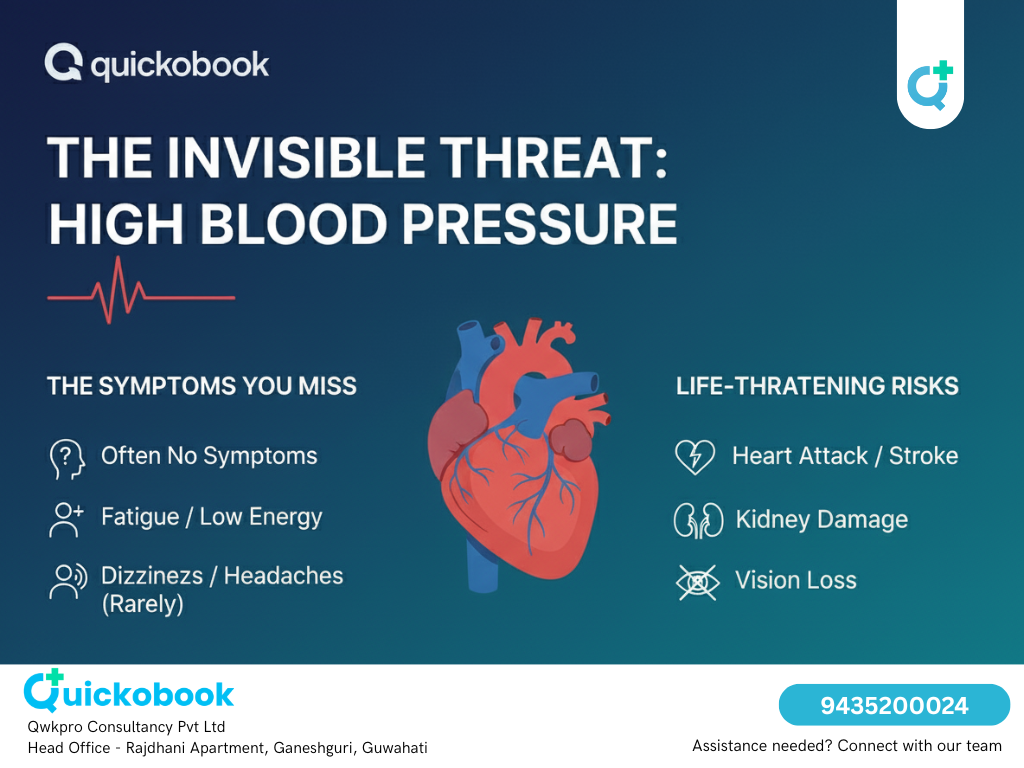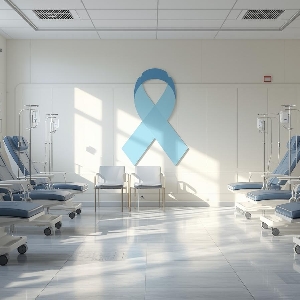The Invisible Threat: High Blood Pressure, The Symptoms You Miss, and the Life-Threatening Risks You Must Avoid
Introduction: The "Silent Killer" Explained Simply
Imagine the pipes in your home—the water lines—being under extreme water pressure all the time. That constant, hidden force won't break the pipes overnight, but over weeks, months, and years, that strain will eventually cause the weakest parts to burst, flood your home, or break your expensive water heater.
Your body works the same way. High Blood Pressure, medically known as Hypertension, happens when your blood pushes too hard against the walls of your arteries. Artery walls are like the pipes of your body. When the pressure is too high, it creates tiny tears and damage that your body tries to patch up. This repair process actually makes the pipes stiffer and narrower over time.
High blood pressure is one of the most common and dangerous health issues globally, and it has earned the terrifying name: "The Silent Killer."
Why? Because for most people, it has absolutely no warning signs. You can feel perfectly fine, look healthy, and lead a normal life, completely unaware that this invisible, high-pressure force is destroying your most vital organs: your heart, brain, and kidneys. Finding it early and treating it is the only way to escape its devastating long-term effects.
Part 1: Unmasking the Silent Threat
Understanding Your Blood Pressure Numbers
When you measure your blood pressure, you get two numbers, measured in millimeters of mercury (mmHg):
- Top Number (Systolic): This is the pressure when your heart beats and pushes blood out.
- Bottom Number (Diastolic): This is the pressure when your heart rests between beats.
|
Your Result |
Top Number |
Bottom Number |
What it Means for You |
|
|
Normal |
Below 120 |
and |
Below 80 |
Your system is running smoothly. |
|
Elevated |
120–129 |
and |
Below 80 |
You are at risk; time for lifestyle changes. |
|
Stage 1 High BP |
130–139 |
or |
80–89 |
See a doctor to start management. |
|
Stage 2 High BP |
140 or high |
or |
90 or higher |
Serious condition; needs immediate medical treatment. |
The simple truth is that unless your blood pressure is in the crisis zone, you likely won't feel a thing. This is why you must take charge of your health and get checked—you cannot rely on feeling "off."
The Myth: Waiting for Symptoms
Many people make a fatal mistake: they wait for a clear sign, like dizziness or a headache, before seeing a doctor. This is a myth you must forget.
The human body is an amazing machine; it adjusts to stress slowly. It may take 10 to 20 years for high blood pressure to cause enough damage to finally produce a symptom. By that time, the damage is already severe and often impossible to fully reverse.
The Few, Extreme Warning Signs
While chronic high blood pressure is silent, if it spikes suddenly to extremely high levels (a medical emergency known as a Hypertensive Crisis—over 180/120 mmHg), your body might finally sound an alarm. If you experience these alongside a high reading, you need to call emergency services immediately:
- Sudden, Severe Headache: An intense, throbbing pain, especially in the back of the head.
- Trouble Breathing: Feeling very short of breath, which can mean fluid is backing up in your lungs.
- Chest Pain: A sign that your heart is under critical stress.
- Vision Problems: Sudden blurring, double vision, or trouble seeing clearly.
- Nosebleeds: Severe and repeated nosebleeds that stop for no clear reason.
These symptoms mean the silent killer has turned into an active emergency. But remember, the goal is to find and treat the problem long before it reaches this stage.
Part 2: The Big Dangers of Ignoring High Blood Pressure
If high blood pressure is left untreated, that constant, hidden strain guarantees damage to the circulatory system, leading to a host of debilitating and life-ending diseases.
1. Heart Attack and Heart Failure: Breaking the Pump
Your heart is a tireless muscle. When it has to pump blood against too much resistance, two things happen:
- Heart Muscle Thickens: The heart’s main pumping chamber (the left ventricle) gets thicker and stiff from working too hard. Over time, it gets less efficient, leading to Heart Failure. It can't pump enough oxygen-rich blood to the rest of the body.
- Arteries Harden: The high pressure wears down the inner layer of the heart’s arteries. This allows fatty materials (plaque) to stick to the walls, making the pipes narrow and stiff. This condition, called Atherosclerosis, is the direct cause of Heart Attacks.
2. Stroke: The Brain’s Disaster
High blood pressure is the single biggest risk factor for having a stroke. The damage it causes to blood vessels in the brain can lead to two types of strokes:
- Ischemic Stroke: A blood clot gets stuck in a narrow artery, blocking blood flow to a part of the brain. The brain cells starve and die.
- Hemorrhagic Stroke: The pressure causes a weakened blood vessel in the brain to burst and bleed.
A stroke can cause permanent disability, paralysis, and severe loss of function.
3. Kidney Failure: Ruining the Filters
The kidneys are full of tiny, delicate capillaries (blood vessels) that act as filters to clean your blood.
- High pressure is constantly straining and scarring these capillaries, stopping them from filtering properly. This is like putting sand in your water filter—it stops working.
- When the kidneys fail, waste and fluid build-up in your body. This is called Chronic Kidney Disease (CKD) and can become so severe that you need dialysis (an artificial filtering machine) or a kidney transplant to survive. High blood pressure is the second leading cause of kidney failure globally.
4. Vision Loss and Eye Damage
The blood vessels in your retina—the back of your eye—are extremely tiny. High pressure can cause them to leak, swell, or burst, a condition known as Hypertensive Retinopathy. Without treatment, this can quickly lead to irreversible blurred vision or total Blindness.
5. Memory Loss and Cognitive Decline
Even if you don't have a major stroke, high blood pressure can cause hundreds of tiny, silent blockages in the brain over time. These small damages slowly affect the parts of the brain responsible for thinking, memory, and concentration. This accumulation of silent damage is a leading cause of a type of memory loss called Vascular Dementia.
Part 3: Taking Control and Booking Your Health
The fight against the silent killer is won with awareness and action. You have the power to protect your future health, but you must start today.
1. Simple Steps to Reduce Your Risk
You can't change your age or family history, but you can change these things:
- Cut the Salt: This is the easiest win. Aim to eat less than 1,500 mg of sodium per day (about half a teaspoon). Avoid highly processed and packaged foods.
- Get Moving: Exercise makes your heart stronger, so it doesn't have to work as hard. Aim for 30 minutes of brisk walking, swimming, or cycling most days of the week.
- Eat Your Veggies: Eat more fruits, vegetables, and whole grains. Foods high in potassium and fiber naturally help lower blood pressure.
- Maintain a Healthy Weight: Losing even a small amount of weight—just 5 to 10 pounds—can make a significant difference in your blood pressure numbers.
- Say No to Tobacco: Quitting smoking is the single best thing you can do for your heart health.
2. The Crucial Step: Regular Professional Check-ups
Since high blood pressure is symptom-free, you must rely on professionals to find it.
Action Item: If you haven’t checked your blood pressure recently, it’s time to book an appointment.
- See a General Physician: Your first and most important step should be consulting a General Physician. They are experts in diagnosing and managing chronic conditions like hypertension and can create a personalized treatment plan for you.
- Easy Booking with Quickobook: Don’t let a complicated process delay your health check. Use a convenient platform like Quickobook to quickly find and book a General Physician near you. You can often see reviews, check availability, and schedule your appointment in minutes.
- Diagnostic Tests: Once diagnosed, your doctor may recommend essential tests to check if the high pressure has already affected your organs. These may include a Kidney Function Test or a Lipid Profile. You must follow through on these steps.
Action Item: You can also easily book a test for key health markers using services found on Quickobook, often with the added convenience of home sample collection. This data is vital for your doctor to understand your overall health picture and protect your organs.
3. Stick to the Plan
If you are diagnosed with hypertension, management is a lifelong partnership with your doctor.
- Take Medication Religiously: If your doctor prescribes medication, take it exactly as directed, every day, without fail. These medicines are your insurance policy against a future stroke or heart attack.
- Do Not Stop: Never stop or adjust your medication because you "feel fine" or your numbers look good. Only your General Physician can tell you if a change is needed.
Conclusion: Take Control of Your Destiny
High blood pressure is a widespread health emergency disguised as harmless silence. The long-term risks—paralysis from a stroke, lifelong dialysis, or heart failure—are terrifying, but they are absolutely preventable.
Don't ignore the hidden danger. Don't wait for a headache or dizziness. Be proactive, be informed, and take control of your numbers.
Your life and your future quality of life depend on early detection and consistent action. Use Quickobook today to book a test or consult with a General Physician and turn the silent killer into a fully manageable condition.
Call to Action: Your Health Can't Wait! Find and Book a General Physician consultation now using Quickobook to get your blood pressure checked and start your path to a longer, healthier life.









Comments (0)
No comments yet. Be the first to share your thoughts!
Leave a Comment